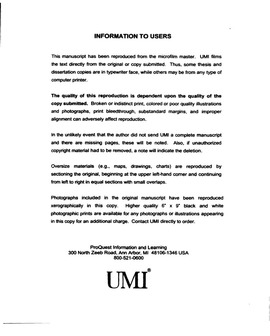| dc.contributor.advisor | Rodgers, Joseph L., | en_US |
| dc.contributor.author | Morrison, Eric Michael. | en_US |
| dc.date.accessioned | 2013-08-16T12:18:28Z | |
| dc.date.available | 2013-08-16T12:18:28Z | |
| dc.date.issued | 2002 | en_US |
| dc.identifier.uri | https://hdl.handle.net/11244/421 | |
| dc.description.abstract | The study's intentions were: first to assess perceptions that were situationally appropriate, second to introduce an instrument that supports anonymous feedback, third to use that instrument to coherently measure leadership application, fourth to focus on members in company-sized units after a training event, and fifth to develop models of the factors influencing efficient leadership. Leadership functions were measured in several categories, including knowledge, decision-making, interpersonal interaction, character, organization-over-person; situational awareness, and policies and records. These categories were viewed prospectively in the context of the production function, in this case through a standardized military training event, which provided a macro-viewpoint of military leadership efficiency. | en_US |
| dc.description.abstract | The purpose of this study was to examine leadership efficiency in the context of the United States Army. Soldiers, Noncommissioned Officers, and Officers were the focus of the study. The study sought to develop a quantifiable measure of leadership efficiency based on the perceptions of soldiers and their leaders in company-sized units. Secondly, the study was interested in the level of leadership efficiency as represented in leadership functions among military leaders from the perspectives of soldiers among the ranks for a given training situation. | en_US |
| dc.format.extent | xvii, 141 leaves : | en_US |
| dc.subject | Psychology, Industrial. | en_US |
| dc.subject | United States. Army Non-commissioned officers. | en_US |
| dc.subject | Psychology, Psychometrics. | en_US |
| dc.subject | Political Science, Public Administration. | en_US |
| dc.subject | Leadership. | en_US |
| dc.subject | United States. Army Officers. | en_US |
| dc.title | Military leadership efficiency: Measuring perceptions of leadership efficiency in the ranks. | en_US |
| dc.type | Thesis | en_US |
| dc.thesis.degree | Ph.D. | en_US |
| dc.thesis.degreeDiscipline | Department of Psychology | en_US |
| dc.note | Adviser: Joseph L. Rodgers. | en_US |
| dc.note | Source: Dissertation Abstracts International, Volume: 63-01, Section: B, page: 0577. | en_US |
| ou.identifier | (UMI)AAI3040837 | en_US |
| ou.group | College of Arts and Sciences::Department of Psychology | |
